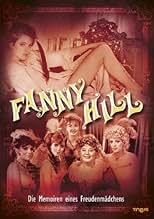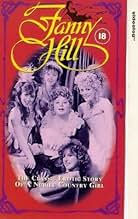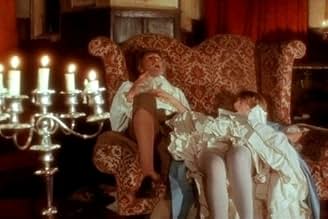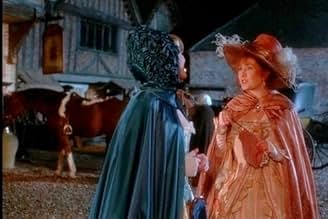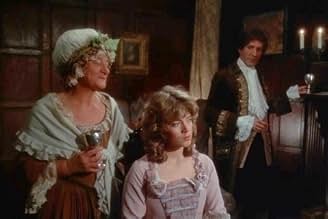Frances è una giovane donna ingenua che arriva a Londra dalla campagna. Lì lavora in un bordello. Il suo fascino e la sua bellezza la rendono molto ambita, ma si innamora di Charles, che non... Leggi tuttoFrances è una giovane donna ingenua che arriva a Londra dalla campagna. Lì lavora in un bordello. Il suo fascino e la sua bellezza la rendono molto ambita, ma si innamora di Charles, che non la ama solo per il suo corpo.Frances è una giovane donna ingenua che arriva a Londra dalla campagna. Lì lavora in un bordello. Il suo fascino e la sua bellezza la rendono molto ambita, ma si innamora di Charles, che non la ama solo per il suo corpo.
- Regia
- Sceneggiatura
- Star
- Fanny Hill
- (as Lisa Raines)
- Mr. John Barville
- (as Wilfred Hyde White)
- Mrs. Brown
- (as Paddy O'Neil)
- Charles
- (as Jonathan York)
- Old Wench
- (non citato nei titoli originali)
- Girl in Bed
- (non citato nei titoli originali)
- Emily
- (non citato nei titoli originali)
- Martha
- (non citato nei titoli originali)
- First Beggar
- (non citato nei titoli originali)
- Mr. Crofts
- (non citato nei titoli originali)
- William
- (non citato nei titoli originali)
- Lady in Intelligence Office
- (non citato nei titoli originali)
- Tubby Client
- (non citato nei titoli originali)
- Mr. H.
- (non citato nei titoli originali)
Recensioni in evidenza
Hill" carried the comment that 'this is one of the most celebrated fictional works of all time', adding that 'it is many years since Fanny Hill was published even clandestinely' and 'open publication is a novelty made possible only by the more sensible standards of our age, and by a deft editorial touch'. This may be an exaggeration - a New York court in 1963 dismissed an application to ban Fanny Hill as obscene with the comment that it does not contain one obscene word. But there is no question that it is an erotic novel.
When any company films such a novel we should surely expect its pedigree to be recognised - the attempt should be made to create an erotic film from any book internationally regarded as a significant piece of erotic literature. Unfortunately this film was created in Britain at the end of the 1970's, a decade when British sex comedies were ten a penny. French directors of this period frequently produced films such as Emmanuelle with genuine claims to be erotic. But contemporary English directors, who could film a romance with sympathy and appreciation, seemed incapable of filming its culmination except as a ludicrous or hilarious performance by the couple concerned. During the decade prior to Fanny Hill, most British sex comedies treated the sex act as intrinsically humorous - we need only remember films such as "Can you keep it up for a week?" or "Confessions of a Handyman". Some were quite well made and remain fun to watch - this is why they constantly reappear on late night television programs - but they are not erotic. However they were the style of film that British directors of the period felt constrained to produce if ever the words "sex comedy" were uttered,. and this style could hardly be less appropriate for a meaningful movie presentation of the classic novel Fanny Hill.
Fanny Hill should have been an important erotic film comparable to Emmanuelle and, like Emmanuelle, it should have remained a film that cinema buffs still periodically search out to view again. Instead it is virtually forgotten - I do not believe that it has ever been released as a DVD, and it would probably not even be easy to buy a tape copy in North America today. The IMDb database currently lists two viewer comments on the film (this should be the third!). Other films with far less potential, but which provide what their viewers expect, continue to generate fresh comments even 20 years later . What went wrong? Fanny Hill is quite well filmed and is a period piece with all the trimmings -stagecoaches on narrow dusty roads, period costumes, delightful old houses etc. This alone usually guarantees success. The acting is probably at least of average quality.
I believe this film failed because the story is treated as a romp which under a different title might have still been watched. Some of the sequences with Mrs Brown's girls viewing what goes on in the various bedrooms through concealed peepholes, as well as the scene featuring a totally uninhibited eighteenth century party, remain quite enjoyable. In a film with lesser pretensions this would have been enough to ensure its ongoing success as a comedy. But here something more was needed. Lisa Foster (Lisa Raines) portrayed an attractive and playful Fanny who, except perhaps at the end when she rushes downstairs to open the door to Charles and is carried upstairs in his arms, seldom appears very involved. Collectively most of Mrs Brown's girls behaved more like seniors in a finishing school than young women forced by economic necessity to market their charms. Eliminating eroticism in favour of humour may be legitimate if no erotic expectations exist; but it is the knell of death for a film based on a classic erotic novel. Some recent British Directors are capable of creating erotic films, and had Fanny Hill been directed by, for example, Ken Russell it might have been much more successful.
One last point - John Cleland's book is written largely in autobiographical form, with Fanny herself relating her experiences as well as explaining how she viewed them. It has been suggested that the book contains nothing but a woman's experiences, and that Cleland must have served simply as a cover for a possibly partly autobiographical book written by one of his female friends. A more recent Brazilian film production under the same name (Fanny Hill 1995 - written and directed by Valentine Palmer) attempts to recreate the story with Fanny's voice alone explaining what is going on during each scene. This sounds an extremely interesting way in which to interpret the novel on the screen, and I would very much like to have the opportunity to see this film. However it is not listed by Amazon, and so far the chance to do so has not come my way.
First, the story, from John Cleland's once banned (and still is in some countries) book has a good story, and probably had some truth in his days. A young girl coming to misfortune after the death of her parents, eventually finding happiness.
Second, the film itself was well shot, well lit, good scenery, with a good accuracy of the period, follows quite well the spirit of the novel. Well done.
Third, actors and actresses. Well known stars such as Oliver Reed, Shelley Winter, Wilfred Hyde-White) contributed interesting characters, I guess to give gravitas to the movie to the relative unknown star, Lisa (Raines) Foster and to encourage cinema goers. I have not seen anything she has done apart from this role, and I thought she was excellent, and I am not referring to the nudity, which is not shocking, although she is extremely beautiful with a very pretty and well defined face, great eyes. It seems to me that she could act, she was serious, she was funny, involved, emotional. She clearly carried the movie, and did not need the stars (although they were amusing) It is a pity that she has not acted in more roles after this. I see in her IMDb entry that she has left acting and now into directing, well done. Does anyone know her email? I would certainly like to wish her luck.
I believe that this movie has been a good contribution to the erotic genre. Over twenty years old and it still captures my imagination and attention. I have bought the DVD and so should you.
Still, this film has not managed to become a genre classic and it is not hard to see why. Most importantly, there is the actress playing the title heroine, Lisa Raines. While she's undeniably pretty (with or without clothes), her acting range is rather limited; it was probably impossible to get an established actress play such an exposed role. The 'innocent young girl' Lisa has to play at the beginning of the film is not completely believable, but much worse she completely fails to exude any sensuality in the later stages. This becomes especially obvious when we compare her to Maria Harper, the vampish actress playing the whore Phoebe. One gets the impression that Lisa/Fanny loves sex as a nice physical exercise in nice company. A similar criticism applies to her love interest: no charisma, no depth, and an instantly forgettable face.
This being a British film it doesn't come as a surprise that the sex scenes do not come across as very erotic, and that seems more of a cultural problem than a problem with censorship. The notable exception are the scenes involving the already mentioned Maria Harper. I suppose, there must be some Italians in her recent ancestry.
The presence of three veteran film stars (Oliver Reed, Shelley Winters and Wilfrid Hyde-White) was also enticing but, unsurprisingly, they are only there for marquee value: Reed's almost incoherent Popeye-ish accent is simply embarrassing, likewise watching flabby madam Winters being surrounded by all that petite naked flesh (not hers, of course, but that of her charges and their consorts) flailing about, but it's octagenarian Hyde-White (in his last film, no less) who tops both of them by snuggling in bed with the title character who is all of 19 years of age; I've seen Hyde-White in several of his earlier films and I'm positive he never performed a love scene in any of them!
Indeed, it's gorgeous leading lady Lisa Foster who, thankfully, indulges in much full-frontal nudity by shedding her clothing completely at every possible opportunity which, even in the heavily-censored variant I've watched, makes this consistently raunchy period piece tolerable; it's a pity that she didn't get much ahead in her acting career as one would certainly have liked to see even more of her. Interestingly enough, she later switched to doing animation work and was also involved in the digital restoration of Walt Disney's SNOW WHITE AND THE SEVEN DWARFS (1937)!
The orphaned innocent Fanny Hill soon falls in with some ladies of ill-repute as she reaches London to better her prospects, and is immediately instructed in what is expected of her by a more experienced companion Phoebe (Maria Harper) by jumping into bed with her, and later spying on their fellow co-workers in action through hidden holes in the wall BELLE DE JOUR (1967)-style! In fact, the film's plot line is very similar to that of Jess Franco's MARQUIS DE SADE'S JUSTINE (1968) and it's small wonder that the producer of that one, Harry Alan Towers, is also behind this production but, while I'd say FANNY HILL is a more agreeable picture, ultimately it's just too blandly made to stick in one's mind for much longer after it's finished.
Lo sapevi?
- QuizFinal film of Wilfrid Hyde-White.
- BlooperAll the prostitutes have clean shaven armpits. Prostitutes of the time had armpit hair because it suggests pubic hair.
- Citazioni
Mrs. Brown: When a lady's getting dressed, Mr Croft, she should never be rushed. Now, when she's getting undressed... that's a different matter.
- Versioni alternativeThe R-rated version has been toned down. The lesbian scene with Fanny and Phoebe was heavily edited. Some of the sexual trysts Fanny and Phoebe were spying on were edited and Phoebe's S&M stage performance was entirely cut.
- ConnessioniVersion of A Comedy Tale of Fanny Hill (1964)
- Colonne sonore'Lascia ch'io pianga' from RINALDO
Music by George Frideric Handel (as Georg Friedrich Händel)
I più visti
- How long is Fanny Hill?Powered by Alexa
Dettagli
- Data di uscita
- Paesi di origine
- Lingua
- Celebre anche come
- Fanny Hill
- Luoghi delle riprese
- Aziende produttrici
- Vedi altri crediti dell’azienda su IMDbPro


